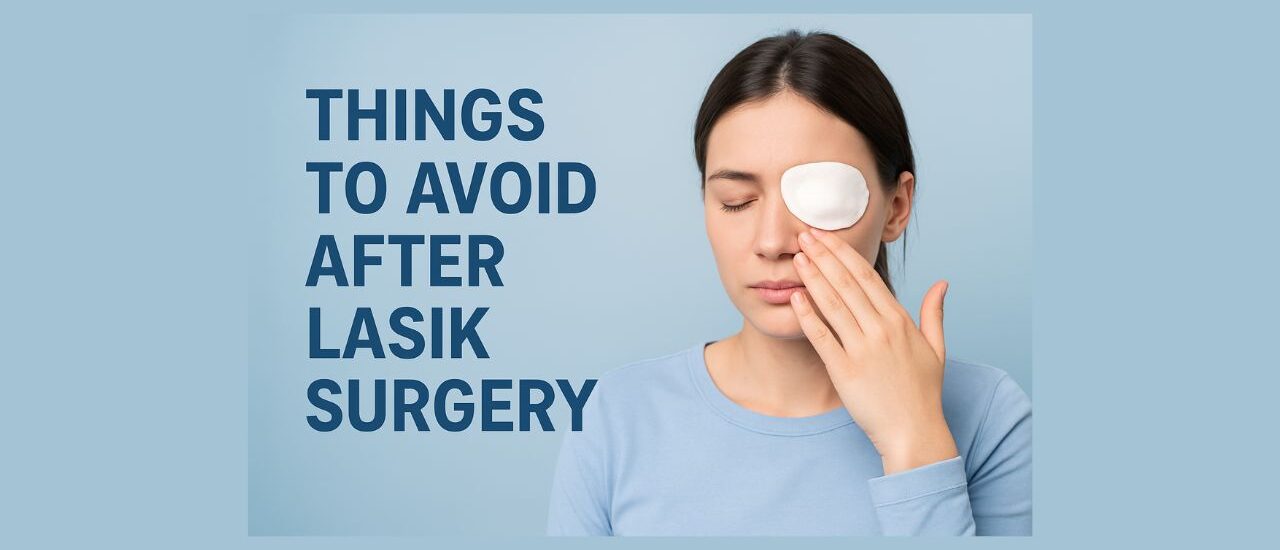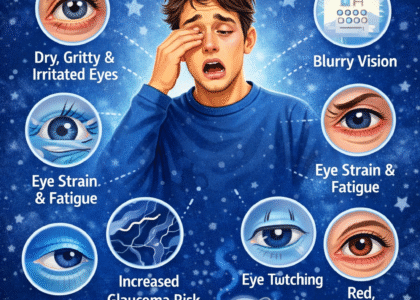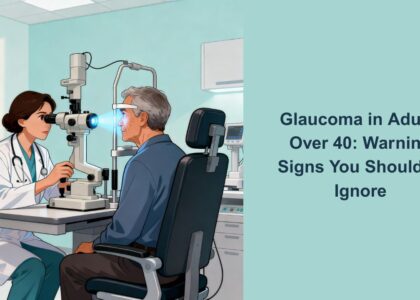Introduction
Undergoing LASIK eye surgery is one of the most rewarding decisions for those who want to enjoy clear vision without the daily hassle of glasses or contact lenses. The procedure itself is quick, safe, and highly effective—but your recovery period plays a crucial role in achieving the best possible outcome.
While LASIK recovery is usually smooth, your eyes remain delicate during the first few days and weeks after the surgery. To protect your vision and prevent complications, there are several important things to avoid after LASIK surgery—and understanding why they matter helps you recover faster and see better.
In this guide, we’ll explain everything you should avoid after LASIK, how long to avoid them, and the reasons behind each precaution.
1. Avoid Rubbing Your Eyes
Why it matters:
After LASIK, a thin flap is created on the surface of your cornea to reshape it for better vision. This flap needs time to heal and reattach properly. Rubbing your eyes during this period can dislodge the corneal flap, leading to infection, inflammation, or distorted vision.
How long to avoid:
Avoid touching or rubbing your eyes for at least 4–6 weeks after surgery. If your eyes feel itchy or watery, use the prescribed lubricating eye drops instead of rubbing.
Tip:
If you tend to rub your eyes while sleeping, wear the protective eye shields provided by your doctor for the first few nights.
2. Avoid Getting Water, Soap, or Shampoo in Your Eyes
Why it matters:
Water from the shower, tap, or swimming pool can carry bacteria and irritants that may cause infection or delay healing. Soaps and shampoos can sting and make your eyes water excessively, which can disturb the healing flap.
How long to avoid:
- Avoid direct splashes of water or soap in your eyes for 1 week.
- Use a clean, damp cloth to gently wipe your face instead of washing it normally.
- When showering, keep your eyes closed and avoid high-pressure water hitting your face.
3. Avoid Exposure to Dust, Smoke, and Pollutants
Why it matters:
After LASIK, your eyes are more sensitive and prone to dryness or irritation. Dust, smoke, and other airborne particles can cause inflammation and discomfort, and increase the risk of infection.
How long to avoid:
Stay away from dusty or smoky environments for at least 2–3 weeks after surgery.
Tip:
If you need to go outdoors, wear UV-protected sunglasses to shield your eyes from dust, wind, and sunlight.
4. Avoid Using Makeup Around the Eyes
Why it matters:
Eye makeup like mascara, eyeliner, or kajal can introduce bacteria and small particles that may irritate your eyes or interfere with the healing process. Makeup removers can also contain chemicals that are harsh on the eyes.
How long to avoid:
Avoid applying any eye makeup for at least 2 weeks after LASIK. Once your doctor gives the go-ahead, make sure to:
- Use new, clean brushes or products (not the old ones you used before surgery).
- Avoid applying makeup directly on the lash line.
5. Avoid Swimming and Hot Tubs
Why it matters:
Pools, hot tubs, and natural water bodies like lakes or beaches contain bacteria, chlorine, and other chemicals that can irritate the eyes and increase infection risk.
How long to avoid:
Stay away from all swimming activities and hot tubs for at least 3–4 weeks post-surgery.
If swimming is part of your routine or job, always consult your ophthalmologist before resuming.
6. Avoid Excessive Screen Time
Why it matters:
Staring at screens (mobile, computer, TV) for long hours can make your eyes dry, strained, and tired—especially when your tear film is still stabilizing after LASIK. This can slow recovery and cause discomfort or blurry vision.
How long to avoid:
- Limit screen use for the first 24–48 hours after surgery.
- Gradually resume digital work after 2–3 days but take regular breaks using the 20-20-20 rule (every 20 minutes, look 20 feet away for 20 seconds).
- Use prescribed lubricating drops regularly to prevent dryness.
7. Avoid Heavy Exercise and Gym Workouts
Why it matters:
Strenuous physical activities increase blood pressure and pressure inside the eyes (intraocular pressure), which can interfere with the healing corneal flap. Sweating can also carry bacteria into your eyes and cause irritation.
How long to avoid:
Avoid intense workouts, yoga inversions, or contact sports for at least 2–3 weeks. You can resume light walking or stretching after your doctor’s approval.
8. Avoid Using Unprescribed Eye Drops or Medications
Why it matters:
Your doctor will prescribe specific antibiotic and lubricating eye drops to support healing. Using over-the-counter or old eye drops can disrupt this balance, introduce infection, or delay recovery.
How long to avoid:
Only use medications prescribed by your LASIK surgeon. Do not self-medicate for redness, itching, or dryness.
9. Avoid Direct Sunlight and Bright Light Exposure
Why it matters:
Your eyes may be extra sensitive to bright light after LASIK. Prolonged sun exposure can cause photophobia (light sensitivity) and strain your healing cornea.
How long to avoid:
For the first few weeks, wear UV-protected sunglasses whenever you go outside during the day. Avoid looking directly at bright light or using high-brightness screens.
10. Avoid Alcohol and Smoking
Why it matters:
Alcohol can dehydrate your body and eyes, slowing down recovery. Smoking irritates the eyes and exposes them to harmful chemicals, increasing the risk of infection or delayed healing.
How long to avoid:
Avoid alcohol and smoking for at least one week after surgery—or longer if possible. The cleaner your body is, the faster your eyes heal.
11. Avoid Driving Immediately After Surgery
Why it matters:
LASIK temporarily affects depth perception, night vision, and clarity in the first few days. Driving too soon can be dangerous for you and others.
How long to avoid:
Avoid driving until your surgeon confirms your vision meets legal driving standards, usually after 2–3 days post-surgery.
12. Avoid Sleeping Without Eye Shields
Why it matters:
During sleep, you might unconsciously rub or press your eyes against the pillow. This can disturb the healing corneal flap.
How long to avoid:
Wear your eye shields for the first 5–7 nights after LASIK, or as advised by your doctor.
13. Avoid Cooking in Smoky or Steamy Environments
Why it matters:
Cooking fumes, steam, and heat can irritate sensitive post-LASIK eyes. The sudden temperature changes may also cause temporary blurriness or discomfort.
How long to avoid:
Take a break from heavy cooking for about one week after your procedure. Use exhaust fans or wear protective glasses if you must cook.
14. Avoid Traveling (Especially by Air) Immediately After LASIK
Why it matters:
Airplane cabins have low humidity, which can worsen dryness in post-LASIK eyes. Traveling too soon also makes it hard to attend your follow-up checkups.
How long to avoid:
It’s best to wait at least one week before flying, and only after your first post-op visit confirms your eyes are healing properly.
15. Avoid Skipping Follow-Up Appointments
Why it matters:
Your follow-up visits allow the surgeon to ensure your eyes are healing as expected. Missing these checkups could mean missing early signs of infection or complications.
How long to avoid skipping:
Never miss any scheduled follow-up visits—typically after 1 day, 1 week, and 1 month of surgery.
Recovery Summary: Quick Reference Table
| Activity to Avoid | Duration | Reason |
| Rubbing Eyes | 4–6 Weeks | Prevent flap displacement |
| Water/Soap Contact | 1 Week | Avoid infection |
| Makeup | 2 Weeks | Prevent bacterial entry |
| Swimming | 3–4 Weeks | Avoid chlorine and germs |
| Heavy Workouts | 2–3 Weeks | Prevent pressure increase |
| Dust/Smoke | 2–3 Weeks | Prevent irritation |
| Alcohol/Smoking | 1 Week | Support faster healing |
| Screen Use | 1–2 Days (limit) | Prevent dryness |
| Driving | Until Doctor Approval | Ensure safe vision |
| Air Travel | 1 Week | Prevent dryness |
| Skipping Follow-ups | Never | Monitor healing |
Final Thoughts
Your LASIK surgery gives you a new vision of life—literally. But proper post-operative care is just as important as the surgery itself. Following these simple “don’ts” ensures you protect your eyes, heal faster, and enjoy the crystal-clear vision you’ve always wanted.
Always remember: Every eye is unique. Follow your surgeon’s personalized advice rather than general internet tips. If you ever experience persistent pain, redness, or blurry vision, contact your eye specialist immediately.







